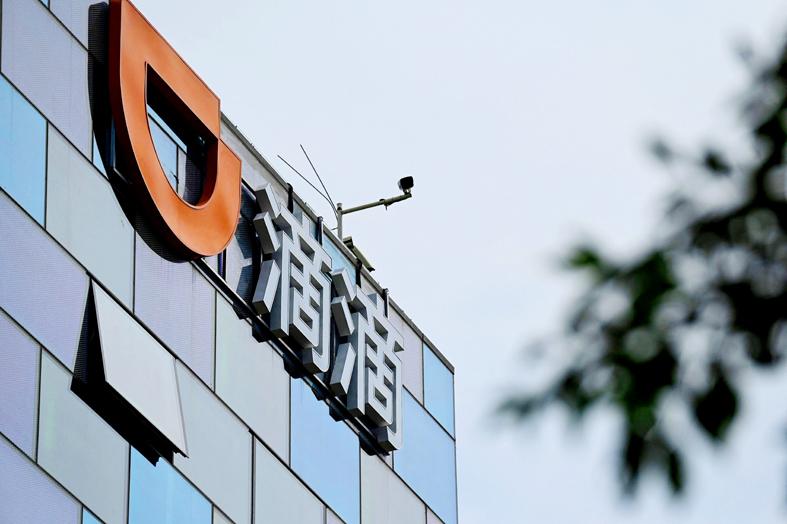Didi Global Inc (滴滴) is helping its workers establish their first union, a groundbreaking decision its fellow technology giants might soon follow as China imposes rules to curb excessive work and protect millions of blue-collar workers from exploitation.
The Beijing-based ride-hailing company announced the creation of the union on an internal forum last week without specifics, according to people familiar with the matter.
Didi drivers — mostly part-time and lacking full employee benefits — would likely be invited to join, one of the people said, requesting anonymity discussing private information.

Photo: AFP
Peers, including food delivery leader Meituan (美團), are also studying the feasibility of internal labor rights organizations, another person said.
Employees at Alibaba Group Holding Ltd (阿里巴巴) have posted calls for the formation of a union on their own company forum, a third person said.
Technology giants such as Didi are responding to regulators’ demands that sharing-economy behemoths improve the welfare of millions of low-wage workers they depend on to power growth.
That stems from Chinese President Xi Jinping’s (習近平) “common prosperity” campaign to get the private sector to share the enormous wealth accumulated during a decade-long Internet boom, while reining in their growing influence.
In Didi’s case, the move might curry favor with Beijng at a time it is said to be fighting to ensure its survival after forging ahead with a US$4.4 billion initial public offering over regulators’ objections.
Didi and Alibaba did not respond to a written inquiry seeking comment. A Meituan representative did not comment on unions, but said in an e-mailed statement it is focused on listening to and helping its delivery riders.
Didi, now under investigation over data privacy breaches, made its internal announcement just after China’s top court and the Chinese Ministry of Human Resources and Social Security published a lengthy essay outlining 10 cases — including, but not limited to the technology industry — in which employees were forced to work extra hours or put in harm’s way, using real and richly detailed court disputes to demonstrate how to fight against labor rights breaches.
The essay was viewed as a fresh warning to technology companies, many of which are known for punishing demands and unreasonable overtime.
It adds to the challenges for an industry already weathering heightened scrutiny over everything from their troves of data to endemic issues such as forced drinking during official functions.
Beijing hopes unions can play a key role in closing a policy loophole in labor protections across the booming sharing economy, particularly as China enacts strict new regulations.
Among other things, the Chinese government intends to impose a cap on the commissions that ride-hailing or meal delivery providers charge their drivers or merchant partners.

Quanta Computer Inc (廣達) chairman Barry Lam (林百里) is expected to share his views about the artificial intelligence (AI) industry’s prospects during his speech at the company’s 37th anniversary ceremony, as AI servers have become a new growth engine for the equipment manufacturing service provider. Lam’s speech is much anticipated, as Quanta has risen as one of the world’s major AI server suppliers. The company reported a 30 percent year-on-year growth in consolidated revenue to NT$1.41 trillion (US$43.35 billion) last year, thanks to fast-growing demand for servers, especially those with AI capabilities. The company told investors in November last year that

Intel Corp has named Tasha Chuang (莊蓓瑜) to lead Intel Taiwan in a bid to reinforce relations between the company and its Taiwanese partners. The appointment of Chuang as general manager for Intel Taiwan takes effect on Thursday, the firm said in a statement yesterday. Chuang is to lead her team in Taiwan to pursue product development and sales growth in an effort to reinforce the company’s ties with its partners and clients, Intel said. Chuang was previously in charge of managing Intel’s ties with leading Taiwanese PC brand Asustek Computer Inc (華碩), which included helping Asustek strengthen its global businesses, the company

Taiwanese suppliers to Taiwan Semiconductor Manufacturing Co. (TSMC, 台積電) are expected to follow the contract chipmaker’s step to invest in the US, but their relocation may be seven to eight years away, Minister of Economic Affairs J.W. Kuo (郭智輝) said yesterday. When asked by opposition Chinese Nationalist Party (KMT) Legislator Niu Hsu-ting (牛煦庭) in the legislature about growing concerns that TSMC’s huge investments in the US will prompt its suppliers to follow suit, Kuo said based on the chipmaker’s current limited production volume, it is unlikely to lead its supply chain to go there for now. “Unless TSMC completes its planned six

TikTok abounds with viral videos accusing prestigious brands of secretly manufacturing luxury goods in China so they can be sold at cut prices. However, while these “revelations” are spurious, behind them lurks a well-oiled machine for selling counterfeit goods that is making the most of the confusion surrounding trade tariffs. Chinese content creators who portray themselves as workers or subcontractors in the luxury goods business claim that Beijing has lifted confidentiality clauses on local subcontractors as a way to respond to the huge hike in customs duties imposed on China by US President Donald Trump. They say this Chinese decision, of which Agence